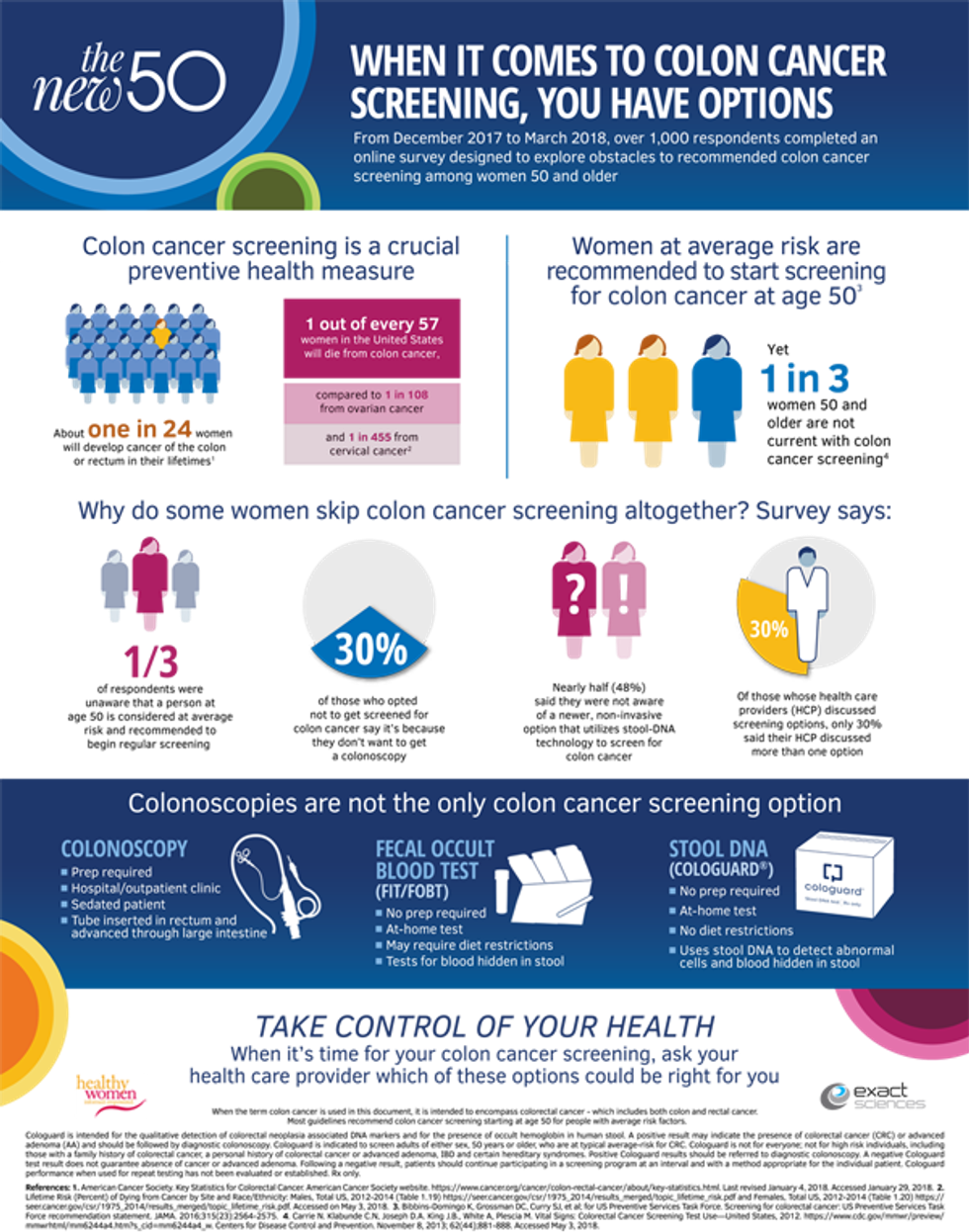Reaching 50 years old is an exciting milestone! And while this is a time for celebration, it's also the age colon cancer screening typically begins because that's when your risk of developing colon cancer increases. It's not everyone's favorite topic, but there are newer, non-invasive options that can be done from the privacy of your home.
About one in 24 women will develop colon cancer in their lifetime, and this, no doubt, concerns many women. During a recent HealthyWomen survey—sponsored by Exact Sciences—women 50 years and older ranked colon cancer as the second cancer they are most worried about, with breast cancer coming in first.
While women are concerned about colon cancer, a significant portion (20 percent) of the HealthyWomen survey respondents had not been screened for colon cancer. Of those not screened for colon cancer, 30 percent said they didn't get screened because they didn't want to get a colonoscopy.
Colon cancer screenings are crucial for early detection. In fact, 90 percent of colorectal cancers are treatable if detected early.
To detect colon cancer earlier, it's critical to know your options and understand that colonoscopies aren't the only colon cancer screening option available. If a noninvasive screening method test is positive, a diagnostic colonoscopy will be required to investigate the cause of the positive screening test. If found, polyps can be removed, and if cancer is found, other procedures are indicated. But, if the non-invasive screening test is negative, you don't need to receive a colonoscopy, and you can wait until the next screening is due. Be sure to talk with your health care provider about what option is best for you.
Here are your options for colon cancer screening that aren't a colonoscopy:
Multitarget stool DNA test (Cologuard): A noninvasive test in which a stool sample collection kit is sent to your home, then sent by you to a lab that analyzes it for abnormal DNA, DNA mutations and a biomarker for blood in the stool that could be associated with cancer or precancer.
Fecal blood test: A noninvasive screening test that uses a stool sample to find blood in the stool, even if no blood is visible.
CT colonography (also known as a virtual colonoscopy): A noninvasive outpatient procedure that does NOT require sedation where health care providers scan the rectum and colon to create 2D or 3D images to check for suspicious growths.
Sigmoidoscopy: An outpatient invasive procedure that does NOT require sedation where the lower part of the colon and rectum are viewed by a health care provider with a sigmoidoscope that is inserted through the rectum and into the first part of the colon.
The first option noted on this list – the multitarget stool DNA test – is convenient and easy-to-use. However, broad awareness of the test remains low as it was only approved by the FDA three years ago. In fact, nearly half (48 percent) of women surveyed have not heard of this test. Once told what it is, nearly two-thirds (63 percent) said they would be very likely to use the test.
It's a great option for those who are 50 years or older and at average risk. It's also included on equal footing among the recommended screening options, including colonoscopy2, by the leading clinical guidelines. It's important to note that the test is not for those with a condition associated with high-risk for colorectal cancer. These include but are not limited to: inflammatory bowel disease, chronic ulcerative colitis, Crohn's disease, familial adenomatous polyposis, or a family history of colorectal cancer.8 Wondering how it all works? Read a woman's first-hand account of her experience with the test.
Regardless of which colon cancer screening option you choose, it's important to get screened. Screenings are crucial for early detection, and early detection is crucial for successfully treating colon cancer.
Read More:
The Importance of Early Detection for Colorectal Cancer
- Colorectal Cancer 101 ›
- Colorectal Cancer: What Every Woman Needs to Know ›
- Fast Facts: What You Need to Know About Colorectal Cancer Screening ›
- Colon Cancer ›
- The Importance of Early Detection for Colorectal Cancer ›
- You Can’t Choose Your Genes - HealthyWomen ›
- Guide to Colon Cancer Screening Tests - HealthyWomen ›
- Guía de pruebas para la detección de cáncer de colon - HealthyWomen ›








